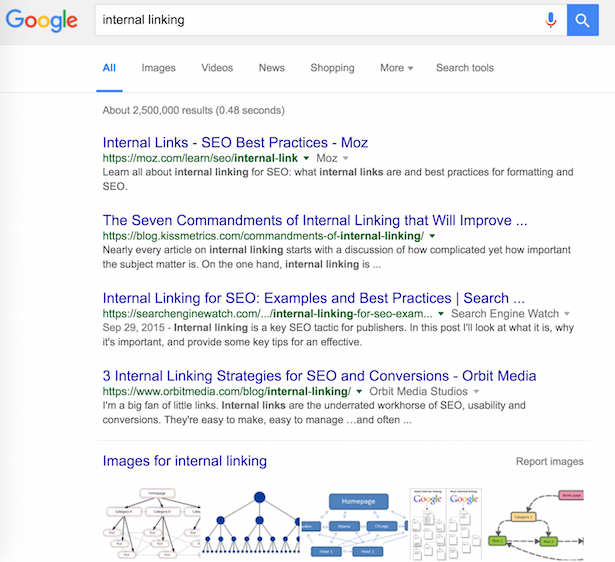Internal linking is a key SEO tactic, one which allows websites to send clear signals to Google on the relative importance of various pages.
It also works from a user experience perspective, helping visitors find pages that are relevant or potentially useful to them.
It’s something I place great importance on as an editor, as it’s one part of SEO that I can control, and I’ve seen the benefits for sites I’ve worked on.
Internal linking: examples
Let’s take an example from Search Engine Watch. I wrote this article on internal linking, with examples and tips, back in September 2015.
I’ve since linked to it using that exact anchor text (and variations on it) on at least 10 occasions. Essentially, I’m telling Google that this is the page I want Search Engine Watch to rank for that term.
As we can see, it’s worked well. Third on Google, and first for related terms (internal linking best practice for example).

Then there’s Mail Online. The most visited English language newspaper on the web had a relatively haphazard approach to internal linking until recently.
For common, high traffic terms (world leader’s names, celebrities etc) would be used regularly in articles.
The result was that each article would end up competing against previous articles for the same keyword or phrase.
The chart below shows its rankings for ‘David Cameron’ over a six month period. 80 different URLs were returned from the Mail for that search, but it didn’t rank consisitently for the term.

The answer was a consistent internal linking and hub page strategy. Mail Online created hub pages for common terms and consistently linked to them.
The result is a more consistent ranking from November 2015 onwards, when the changes were implemented.
There have been some fluctuations, perhaps due to inconsistent implementation of the linking strategy, but the page is performing much more effectively. As a result, the site will pick up more traffic for that term. Applied across the whole site, this can make a big difference.

Does Google count anchor text in internal links?
This is the question Shaun Anderson from Hobo Web sought to answer recently.
In the examples above, the pages targeted with internal links all contain the keywords used in the anchor text. So, Google could be using the content of the page, and the fact that several pages link to it to decide on the ranking.
In other words, this doesn’t prove that Google is taking note of the anchor text when choosing to rank a particular page.
So, Shaun set up a test. He added an internal link to one page on his site using the target keyword as anchor text.
It’s important to note that the target page did not contain the keyword used, so the only signal that it was relevant to said keyword was the anchor text on the link.
As we can see from the chart, a number of days after the test was implemented, the page ranked for the target term. When it was removed, the page dropped again.

As that page had no other relevance to the term other than the link, the anchor text appears to be the only reason for the page’s ranking.
It’s worth reading Shaun’s blog post for more detail, and for further variations on the test, but the indications are that the answer to the question in the headline here is yes.
It would be good to see other tests to back up this with more evidence. In fact, I’ll see if I can devise one on this site along similar lines.
Source Search Engine Watch http://ift.tt/1WWRtwL
